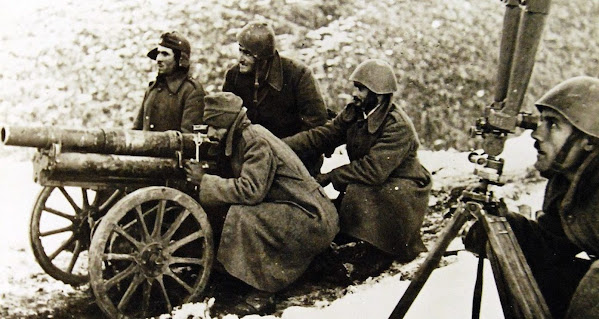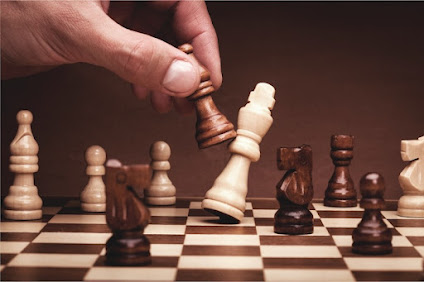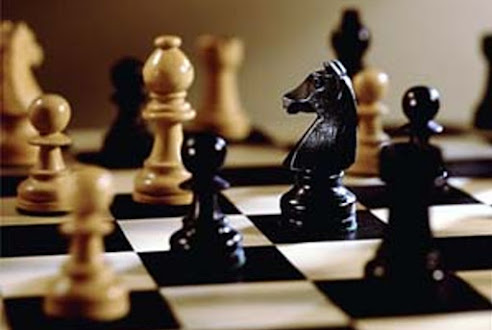The game of chess is not supposed to be a realistic simulation of a battle. But, on one point, it may provide a fundamental hint: wars are mostly a question of command and control. Killing or neutralizing the leader (the king) may cause the collapse of the country's military forces. But, in modern times, country leaders are rarely killed by their enemies, rather, they are controlled, sometimes in subtle ways that involve them engaging in foolish or counterproductive actions.
If the world is a giant chessboard, then the leaders of the major powers are equivalent to the "king" in chess. It is a common perception that whatever is being done in the giant struggle, is done by specific orders from the great leader, be him Putin, Biden, Xi Jinping, or whoever controls -- or is said to control -- a country.
This perception opens up a chess-like strategy that consists in eliminating the enemy leader. But that is rarely a good idea. Unlike what happens in chess, a dead leader may be turned into a heroic figure by propaganda, and then replaced by another one who may be even more warlike. So, a better strategy could consist in controlling the enemy leader(s), something that you cannot do in Chess. If you can convince your enemy to make poor strategic choices, you are halfway to victory (Sun Tzu never said that in his "The Art of War", but he could have).
So, let's see if we can find historical examples of this strategy having been successfully applied in the recent past. I can propose at least three.
1. Louis Napoleon (Napoleon III), 1808 – 1873. The nephew of Napoleon Bonaparte, turned Emperor of the French, is such a fascinating figure that I dedicated at least four posts to him (see below). The fascination about him derives from the fact that he was thoroughly, completely, and hopelessly incompetent. All his major decisions seemed to be aimed at ruining the remaining chances for France to become a world power, as it had been during the reign of his uncle, Napoleon 1st. One of these decisions was especially disastrous: when Louis Napoleon helped the Piedmont King, Vittorio Emanuele II, to defeat the Austrians and then unify Italy into a single kingdom. The result was the creation of a state that forever blocked all the attempts of France to expand in North Africa. Was Luis Napoleon controlled by the Piedmontese? It seems that he was: the control took the form of the work of the Countess of Castiglione, aka Virginia Oldoini, one of the most beautiful women of the time. She was sent to France by her cousin, the Prime Minister of the Piedmontese government, with the explicit purpose of becoming Louis Napoleon's lover and influencing his decisions. It is hard to say how effective Ms. Oldoini was, considering that Luis Napoleon took plenty of bad decisions even before knowing her. But we may at least suspect that she had a role in shaping the world as it is today.
2. Benito Mussolini, 1883 – 1945. You could say that his first years of leadership went reasonably well. The turning point for him seems to have been the invasion of Ethiopia in 1935. Still today, we may wonder how it was possible that the Italian government engaged the country in the conquest of a territory that held nothing of interest for the Italian economy and that, much worse, was a gigantic burden for the state's coffers. It should have been obvious that the military forces stationed there could not be resupplied in case of a major conflict and were destined to be defeated. Which was precisely what happened. Was the idea of invading Ethiopia "planted" in Mussolini's mind by the British secret services? If that was the case, it was a remarkably successful trick that considerably weakened Italy's military power at the start of World War II. How could that have been obtained? It is hard to think that Mussolini could be controlled using women: he was a renowned womanizer and had plenty of them. But we know that the British secret services had paid him to push the Italian government to join the Allies during WWI. Then, in 1925, Britain had agreed to sign a treaty known as the "Anglo-Italian Agreement" that said, essentially, "if you want to invade Ethiopia, go ahead, we won't move a finger to stop you." That opened up for Mussolini the road to put into practice a mad idea of his: that of rebuilding the ancient Roman Empire, maybe with him becoming emperor. Instead, he ended up hanged by the feet, but that's the way history works. Incidentally, Mussolini's removal from power in 1943 is a remarkable example of a Chess-like decapitation strategy in modern times. Without a leader, the Italian armed forces disbanded and ceased to fight in days.
3. Saddam Hussein, 1937 – 2006. Hussein was another remarkably incompetent leader who engaged his country in a disastrous war against neighboring Iran, probably thinking of himself as the heir of the Arab leaders who had conquered Iran during the 7th century AD. His doom came when he took another disastrous decision, that of invading Kuwait in 1990. It is well known that, before invading, Hussein met the US ambassador in Iraq, April Glaspie, and discussed with her his grievances with the Kuwait government. We have the transcripts of their discussion: while she never explicitly encouraged Hussein to invade Kuwait, she also didn't mention that the US would have been strongly displeased. Then, surely, not everything that was said was also transcribed, and we may imagine that Hussein would not have invaded Kuwait if he had imagined the US reaction. On the contrary, he may have taken what the ambassador said as a green light. After all, the US had supported Iraq in the war against Iran, so Hussein could easily imagine that the US would continue to support him. We will never know, but we may at least suspect that Hussein was framed and pushed into making the mistake that would eventually lead to his death and the destruction of Iraq.
There are surely more examples of absurd decisions taken by country leaders. That may be the case with Stalin's decision to invade Finland in 1939. It looked like an easy task, but it cost more than 300,000 casualties to the Soviet Union. Then, some people argue that the Japanese attack on Pearl Harbor in 1941 was, at least in part, a trap created by the American diplomacy to put them in a position from which they could not back down anymore. But the three examples I listed, I think, are enough to indicate that a strong leader can be pushed to take bad decisions by foreign forces, although the methods for doing so are not straightforward.
Neither money nor intimidation can do much to control top-level leaders: they are riding the tiger, so, they afford to appear weak, or -- worse -- as traitors to their countries. Sex may be a more effective tool, and the recent story of Jeffrey Epstein tells us that many politicians may have sex-related skeletons in their closets. But truly powerful leaders can intimidate their critics and afford to be womanizers or sexual perverts. Silvio Berlusconi in Italy is a case in point.
So, stroking an overinflated ego may be the best strategy to influence a leader. All country leaders are normally lone men (very rarely women) surrounded by people who have no interest and no convenience in contradicting them. Older leaders may be especially sensitive to this approach and, surely, in getting older, their mental capabilities do not improve. Lev Tolstoy gave us a remarkable description of how Napoleon (the first) made incredible mistakes simply by doing the things that had been doing before and then discovering in horror that these things didn't work anymore (see below).
In this light, the best controlling technique to defeat a foreign leader can be called "The Saddam Trap" (we may also call it "Saddamization." It does sound bad but, just for this reason, it may be a suitable definition). The Saddam Trap consists in enticing the leader to engage the country in a military adventure that, in the beginning, looks like a cakewalk (what could go wrong with invading Kuwait?) Then, it turns out to have been a trap from which the great leader cannot extricate himself without losing face-- which for him is equivalent to admitting defeat. Leaders cannot admit defeat, they can only double down and hope that making a mistake bigger will turn it into a success. Except that it doesn't always work. And then history moves forward, unforgiving as usual.
The study of history may tell us much about our present, but we have to be cautious in interpreting current events according to similarities with previous ones. And don't forget that the "great leaders" are few: most of our politicians can be bought on the cheap, we don't need to look for sophisticated strategies. So, we cannot say with certainty how exactly some recent events can be interpreted in terms of one or more leaders being trapped Saddam-style or, simply, paid to sell their country to a foreign power. With time, though, we will know.
_______________________________
Lev Tolstoy: War and Peace.
Napoleon was experiencing a feeling of depression like that of an ever-lucky gambler who, after recklessly flinging money about and always winning, suddenly just when he has calculated all the chances of the game, finds that the more he considers his play the more surely he loses.
His troops were the same, his generals the same, the same preparations had been made, the same dispositions, and the same proclamation courte et energique, he himself was still the same: he knew that and knew that he was now even more experienced and skillful than before. Even the enemy was the same as at Austerlitz and Friedland yet the terrible stroke of his arm had supernaturally become impotent.
All the old methods that had been unfailingly crowned with success: the concentration of batteries on one point, an attack by reserves to break the enemy’s line, and a cavalry attack by ‘the men of iron,’ all these methods had already been employed, yet not only was there no victory, but from all sides came the same news of generals killed and wounded, of reinforcements needed, of the impossibility of driving back the Russians, and of disorganization among his own troops.
Formerly, after he had given two or three orders and uttered a few phrases, marshals and adjutants had come galloping up with congratulations and happy faces, announcing the trophies taken, the corps of prisoners, bundles of enemy eagles and standards, cannon and stores, and Murat had only begged leave to loose the cavalry to gather in the baggage wagons. So it had been at Lodi, Marengo, Arcola, Jena, Austerlitz, Wagram, and so on. But now something strange was happening to his troops.
Despite news of the capture of the fleches, Napoleon saw that this was not the same, not at all the same, as what had happened in his former battles. He saw that what he was feeling was felt by all the men about him experienced in the art of war. All their faces looked dejected, and they all shunned one another’s eyes only a de Beausset could fail to grasp the meaning of what was happening.
But Napoleon with his long experience of war well knew the meaning of a battle not gained by the attacking side in eight hours, after all efforts had been expended. He knew that it was a lost battle and that the least accident might now with the fight balanced on such a strained center destroy him and his army.
When he ran his mind over the whole of this strange Russian campaign in which not one battle had been won, and in which not a flag, or cannon, or army corps had been captured in two months, when he looked at the concealed depression on the faces around him and heard reports of the Russians still holding their ground a terrible feeling like a nightmare took possession of him, and all the unlucky accidents that might destroy him occurred to his mind. The Russians might fall on his left wing, might break through his center, he himself might be killed by a stray cannon ball. All this was possible. In former battles he had only considered the possibilities of success, but now innumerable unlucky chances presented themselves, and he expected them all. Yes, it was like a dream in which a man fancies that a ruffian is coming to attack him, and raises his arm to strike that ruffian a terrible blow which he knows should annihilate him, but then feels that his arm drops powerless and limp like a rag, and the horror of unavoidable destruction seizes him in his helplessness.
The news that the Russians were attacking the left flank of the French army aroused that horror in Napoleon. He sat silently on a camp stool below the knoll, with head bowed and elbows on his knees.
________________________________________
Posts on Louis Napoleon







